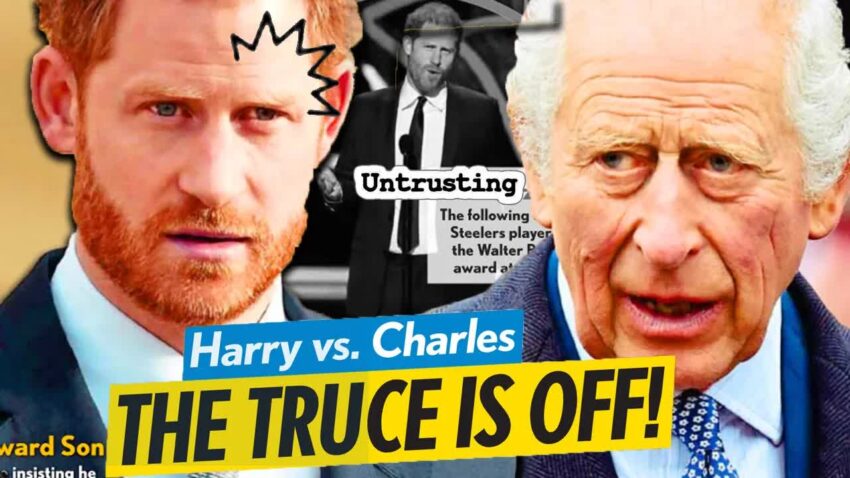The ongoing feud between Prince Harry and King Charles III has taken a sharp turn as the truce seems to have crumbled, leaving many wondering about the future of the Sussexes within the royal family.
With King Charles III facing a cancer crisis, tensions have been heightened, adding unexpected fuel to the already strained relationship.
As the saga unfolds, questions arise about the true nature of this rift and whether reconciliation is still a possibility.
It has been several years since Prince Harry and Meghan Markle made the controversial decision to step down from their roles as senior royals and relocate to California.
Their newly launched website, Sussex.com, appears to be a point of contention within the family, as it prominently features their royal titles and official coat of arms.
This, coupled with Harry’s seemingly brief visit to London following his father’s cancer diagnosis, has raised eyebrows among insiders.
Reports suggest that Harry’s visit to Clarence House, where he spent only a short time with his father before jetting off to Las Vegas for a public appearance, was perceived as more of a publicity stunt than a genuine display of concern.
Despite past attempts at reconciliation between Charles and Harry, recent events indicate a definitive breakdown in communication and understanding.
While there were initial signs of progress in the strained relationship between Charles and Harry at the beginning of 2024, recent developments have reignited tensions within the royal family.
Prince William, feeling betrayed by his brother’s actions, reportedly harbors resentment towards Harry for his perceived lack of support during Charles’ health crisis.
The dynamics within the royal family have been further complicated by Harry and Meghan’s selective engagement with royal duties, raising questions about their commitment to the institution.
As the rift deepens, concerns mount over the implications of a potential reconciliation with Harry and Meghan.
The couple’s track record of controversial behavior and questionable decisions, including offers to assist during King Charles and Princess Catherine’s absence, have drawn criticism and skepticism from royal insiders.
The prospect of reintegrating Harry and Meghan into the fold is met with apprehension, given their history of exploiting royal connections for personal gain.
Amidst the turmoil, the royal family continues to navigate challenges with resilience and unity.
While external pressures and internal conflicts persist, the core members of the monarchy remain steadfast in their commitment to upholding tradition and duty.
The unwavering support for King Charles from his immediate family, including Queen Camilla, Prince William, and the Princess of Wales, underscores a sense of solidarity and determination to weather the storm.
In contrast, Harry and Meghan’s actions have sparked controversy and division, leading to widespread disillusionment and skepticism.
The couple’s self-serving motives and penchant for drama have alienated them from the royal establishment, casting a shadow over their credibility and intentions.
As they grapple with legal issues and public scrutiny, their future within the royal sphere remains uncertain.
The repercussions of Harry and Meghan’s choices reverberate beyond the confines of the royal family, resonating with a global audience that closely observes their every move.
The narrative of betrayal and opportunism surrounding the couple has tarnished their reputation and eroded trust among supporters and critics alike.
The once-promising prospects of a harmonious return to royal duties now seem increasingly remote, as the specter of past transgressions looms large.
In conclusion, the saga of Harry vs. Charles epitomizes the complexities and challenges inherent in royal dynamics.
As the dust settles and tensions simmer, the enduring legacy of this feud serves as a cautionary tale of ambition, ego, and consequence.
The royal family’s resilience in the face of adversity stands in stark contrast to the tumultuous journey of Harry and Meghan, highlighting the enduring power of tradition and duty in times of uncertainty.
